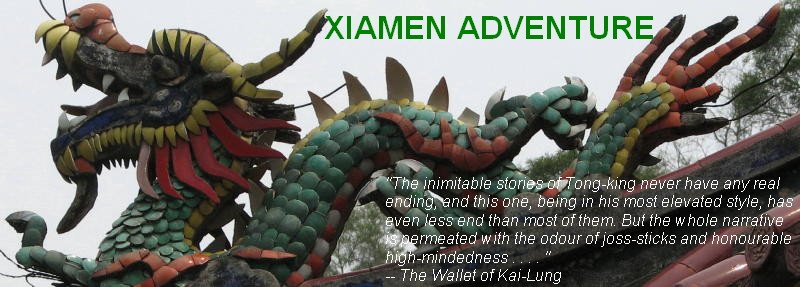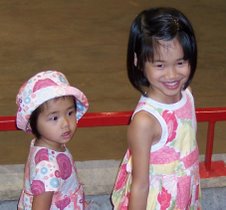 We left the Yangshou Mountain Retreat at 10 a.m. on Saturday to get a taste of the countryside. We walked through farmers’ fields and visited a local farm house. (Zoe and Maya actually had fun, though in the picture above they seem to have that "how did I get here?!" look of Paris Hilton and Nicole Richie down on the farm in "The Simple Life!")
We left the Yangshou Mountain Retreat at 10 a.m. on Saturday to get a taste of the countryside. We walked through farmers’ fields and visited a local farm house. (Zoe and Maya actually had fun, though in the picture above they seem to have that "how did I get here?!" look of Paris Hilton and Nicole Richie down on the farm in "The Simple Life!")As we walked down the dusty road from the hotel, the first point of interest was the village graveyard. Chinese are traditionally cremated, and the urns sealed in above-ground mausoleums. I saw these mausoleums set into the mountains from the train as we approached Guilin, but I didn’t know what they were. This one looks pretty plush; most were unadorned concrete. A few still had flowers and decorations (like this one) from Grave Sweeping Day (April 5 – also called Ghost Day (that’s an obvious one, right?) and Cold Food Day (because you aren’t supposed to light fires on this day to commemorate some ancient figure who was burned to death on this day) and Mountain Climbing Day (because you climb the mountain up to mausoleums)).
 Most of the fields we saw were rice fields, the plants two months old and one month shy of harvest time. In the warm climate of Guangxi Province the growing season allows for two rice plantings. All of our guides have called the rice “paddy rice,” which was a new usage for me. I’ve heard of rice paddies – the wet fields where rice is grown. But “paddy rice?” Apparently that is what rice is called – really, I looked it up on the internet! – when the grains are still covered by the hull.
Most of the fields we saw were rice fields, the plants two months old and one month shy of harvest time. In the warm climate of Guangxi Province the growing season allows for two rice plantings. All of our guides have called the rice “paddy rice,” which was a new usage for me. I’ve heard of rice paddies – the wet fields where rice is grown. But “paddy rice?” Apparently that is what rice is called – really, I looked it up on the internet! – when the grains are still covered by the hull. You can tell the rice is ready to be harvested when the hulls turn from green to golden yellow. They were still green when we passed by.
You can tell the rice is ready to be harvested when the hulls turn from green to golden yellow. They were still green when we passed by. We also walked through fields of pomolo – a kind of grapefruit, but more pear-shaped. Cristy told us that pomolo is a required wedding gift from the bride’s family; they give four bags of pomolo and one is tied at each corner of the bed on the wedding night to ensure fertility. Apparently pomolos are a prized commodity – we saw the farmer just squatting in the orchard and Cristy said she was there to make sure no one took the fruit. In another pomolo field we saw a little lean-to, and Cristy said that someone from the family probably slept there at night to prevent thieves from stealing the fruit. We also saw pumpkin, tomato, and strawberries growing.
We also walked through fields of pomolo – a kind of grapefruit, but more pear-shaped. Cristy told us that pomolo is a required wedding gift from the bride’s family; they give four bags of pomolo and one is tied at each corner of the bed on the wedding night to ensure fertility. Apparently pomolos are a prized commodity – we saw the farmer just squatting in the orchard and Cristy said she was there to make sure no one took the fruit. In another pomolo field we saw a little lean-to, and Cristy said that someone from the family probably slept there at night to prevent thieves from stealing the fruit. We also saw pumpkin, tomato, and strawberries growing.In the distance we could see a small farming village nestled at the foot of a mountain and partially obscured by the lush foliage surrounding it. Too storybook, isn’t it?
 As we approached, I started taking pictures of what I thought must be the houses the farmers lived in – it turns out I was snapping pictures of the pig sty, which was made abundantly clear by the smell as we passed by!
As we approached, I started taking pictures of what I thought must be the houses the farmers lived in – it turns out I was snapping pictures of the pig sty, which was made abundantly clear by the smell as we passed by! But then I didn’t find that the actual houses were a great improvement over the pig house (they didn't smell, though!) – but note the satellite dish at this home!
But then I didn’t find that the actual houses were a great improvement over the pig house (they didn't smell, though!) – but note the satellite dish at this home! I didn’t see a satellite dish at the farmhouse we visited, though there was a television set and an electric rice cooker in the front sitting room (I’m assuming the rice cooker was with the TV because that was the only place with electricity). Still, to say it was rustic is an understatement. Directly to the left of the door was the stall for the family water buffalo, and the tied bundles of sticks are firewood. The Chinese New Year decorations are still up, and Lili says people just leave them up until they fall to pieces – they never last quite to the next New Year.
I didn’t see a satellite dish at the farmhouse we visited, though there was a television set and an electric rice cooker in the front sitting room (I’m assuming the rice cooker was with the TV because that was the only place with electricity). Still, to say it was rustic is an understatement. Directly to the left of the door was the stall for the family water buffalo, and the tied bundles of sticks are firewood. The Chinese New Year decorations are still up, and Lili says people just leave them up until they fall to pieces – they never last quite to the next New Year. Immediately inside the door was the sitting room, with the family altar high among the eaves directly across from the door.
Immediately inside the door was the sitting room, with the family altar high among the eaves directly across from the door. Below the altar was a wall of posters – posters of movie stars (so maybe they had satellite TV after all!). One poster even half-covered a portrait of Mao (you can't mistake that high forehead!)! I bet you wouldn’t have seen that 20 years ago, no one would have dared.
Below the altar was a wall of posters – posters of movie stars (so maybe they had satellite TV after all!). One poster even half-covered a portrait of Mao (you can't mistake that high forehead!)! I bet you wouldn’t have seen that 20 years ago, no one would have dared. To the right of the living room was the farmer’s bedroom, behind a curtain. We didn’t go in there, though. Then behind the sitting room was another room, whose function was a little mysterious to me. It had a ladder to the second floor, and it housed a rice thresher.
To the right of the living room was the farmer’s bedroom, behind a curtain. We didn’t go in there, though. Then behind the sitting room was another room, whose function was a little mysterious to me. It had a ladder to the second floor, and it housed a rice thresher. Next was some kind of utility room, reached via an open-air passage decorated with a lovely spider web. I definitely need to know who their interior decorator is!
Next was some kind of utility room, reached via an open-air passage decorated with a lovely spider web. I definitely need to know who their interior decorator is!  The utility room had a fireplace (you can see it on the right in this photo), but you can see by the soot-blackened walls that the smoke didn’t really have anywhere to go. I’d guess that the room is basically a laundry room.
The utility room had a fireplace (you can see it on the right in this photo), but you can see by the soot-blackened walls that the smoke didn’t really have anywhere to go. I’d guess that the room is basically a laundry room. And next to the utility room was the kitchen. Here’s the cook stove – it, and the fireplace, explain the need for all that firewood.
And next to the utility room was the kitchen. Here’s the cook stove – it, and the fireplace, explain the need for all that firewood. Opposite the cook stove was the kitchen table, and a kiddie chair – Cristy explained that the farmer was taking care of a grandchild while the parents were working in another province.
Opposite the cook stove was the kitchen table, and a kiddie chair – Cristy explained that the farmer was taking care of a grandchild while the parents were working in another province. The family’s water buffalo was out in the fields, but we did catch site of a neighbor’s in the shade of a patch of bamboo, to the delight of the girls. I couldn’t coax them close enough for a group portrait, though!
The family’s water buffalo was out in the fields, but we did catch site of a neighbor’s in the shade of a patch of bamboo, to the delight of the girls. I couldn’t coax them close enough for a group portrait, though! Cristy was careful to tell us that, though the farmers make no more than 400 yuan a month (less than $50), they are happy with their lives. When a journalist visited the village recently, the farmers told him in glowing detail how happy they were that they could enjoy the beautiful mountain views and grow just about everything they needed to live. Ah, yes, living close to the land, the nobility of labor, yada yada yada. . . .
Cristy was careful to tell us that, though the farmers make no more than 400 yuan a month (less than $50), they are happy with their lives. When a journalist visited the village recently, the farmers told him in glowing detail how happy they were that they could enjoy the beautiful mountain views and grow just about everything they needed to live. Ah, yes, living close to the land, the nobility of labor, yada yada yada. . . . All I can say is it looked like a miserable way to live. It made me ever so grateful for the life I lead, and I don’t think I’ll complain again about the headaches of urban living.







1 comment:
Green acres is the place for me! Yeah, right. I enjoy my modern conveniences too much. The satellite dishes in homes with essentially single burner wood stoves for cooking just cracks me up. It seems like my memory of the US pioneers generally included wood burning or potbelly stoves that had the equivalent of at least two "burners" or cooking spots. Have we just always done things to excess?
Whitaker
Flower Mound, TX
Post a Comment